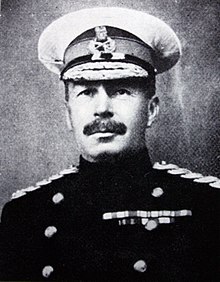Henry Lukin
| Sir Henry Timson Lukin | |
|---|---|

Sir Henry Lukin
|
|
| Nickname(s) | Tim |
| Born |
24 May 1860 Edith Villas, Fulham, England |
| Died | 15 December 1925 (aged 65) Muizenberg, Cape Province |
| Buried at | Cape Town, South Africa |
| Allegiance |
|
| Service/branch | Army |
| Years of service | 1878–1919 |
| Rank | Major General |
| Unit | Cape Mounted Riflemen |
| Commands held | 1st South African Infantry Brigade 9th (Scottish) Division 64th Division |
| Battles/wars |
Anglo-Zulu War Basutoland Gun War Bechuanaland Campaign Second Boer War First World War |
| Awards |
Knight Commander of the Order of the Bath Companion of the Order of St Michael and St George Distinguished Service Order |
| Other work | First president of the British Empire Service League (SA) |
Major General Sir Henry Timson Lukin KCB, CMG, DSO (24 May 1860 – 15 December 1925) was a South African military commander. He fought in the Anglo-Zulu War (1879) and the Basutoland Gun War (1880–1881), the Bechuanaland Campaign (1897), and the Anglo-Boer War when he was in command of the artillery during the defence of Wepener for which action he was awarded a Distinguished Service Order. From 1900 to 1901 he commanded the Cape Mounted Riflemen, from 1904 to 1912 he was Commandant-General of the Cape Colonial Forces and in 1912 Inspector-General of the Permanent Force of the Union of South Africa.
Brig Gen Lukin transferred to the new Union Defence Forces in 1912 as Inspector-General of the Permanent Force. He commanded a formation in the German South West Africa Campaign (1914–1915), and commanded the 1st South African Infantry Brigade of the South African Overseas Expeditionary Force in Egypt (1916) and France (1916), at Delville Wood before being promoted to a divisional command in the British Army. He was knighted for his war service, and retired in 1919.
Lukin was the only son of barrister-at-law Robert Henry Lukin of the Inner Temple; Henry or Harry Lukin, as he was usually known, had a sister two years younger and lost his mother when sixteen years old. Henry Lukin did not enter Sandhurst despite a family military tradition. Following the death of his mother in 1867, Lukin instead sailed for Durban in South Africa in January 1879 and was commissioned as lieutenant into the 77th Regiment of Bengough's Horse at the start of the Anglo-Zulu War during which he was seriously wounded at Ulundi in 1879. He transferred to the Cape Mounted Riflemen (CMR) on 23 March 1881 and participating in Basutoland Gun War that year. In 1893 he attended the gunnery and signal course at Woolwich and Shoeburyness in Britain and in 1894 he was promoted to Captain.
...
Wikipedia
